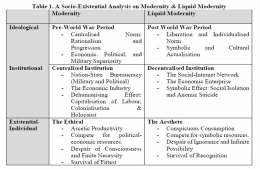This article explores Kierkegaard’s modes of existences through a sociological framework. By applying macro-historical analysis, the author attempts to trace how societal structure is corelated with the individual experience. As ideological thought in society reinforces the notion of social exclusion, the individual would experience different form of despair: the ethicist experience conscious despair and of lacking infinitude and possibility in modernity, the aesthete experience despair of ignorance and of lacking finitude and necessity in liquid modernity. Based on these premises, the author attempts to describe the sociological correlation between ideologies, social institution, and the individual existence in the society.
Keywords: Modernity, Liquid Modernity, Ethical Individual, Aesthete Individual, Existential Despair
Introduction
The objective of this paper is to explore the existential relation between the individual and society. The individual mode of existence is parallel with the societal mode of thought. And it is the aim of this article to describe the individual existential condition by tracing its effect from the collective experience of the society. In order to achieve this aim, the author employs a similar Kierkegaardian analysis towards modernity and liquid modernity by using various sociological terms to capture the external societal context and imputing existential terms to diagnose the internal existential condition of the individual.
Kierkegaard has criticized Hegel, chief of socio-historical analyst, for his objective systemisation on the society and yet have sacrificed the analysis of the human individual – a typical commentary of modern society (Kierkegaard, 2009: 161-165, 294-295; Paula in Stewart, 2011: 34). It may be concluded that the objective analysis has “dehumanized” the subject, and thus the accumulation of abstract knowledge does not have the qualitative capacity to transform the individual; it is the subjective – the personalisation of knowledge in a concrete existential sense, is a matter of relevance. However, by focusing the discursive spotlight on the individual, Kierkegaard was less concern to extend his existential reading into the collective crowd. If Kierkegaard claims that every individual should be detracted from the crowd and reflects subjectively for his own existence, then the author would like to argue that it is also important for the individual to know the crowd to distinguish the properties of the self and the society.
One implication of such premises is to personalise knowledge into the personal existence. As this paper applies an existential sociological analysis, the author attempts to analyse the relation between the two poles: the objective (ideology) and subjective (individual experience). It does not deny the classical tradition to describe the ontological existence of social facts but complements it by adding personalising effect on the individual experience (Tiryakian, 1965). Ideology is contingent with the individual modes of existences. Every type of society is governed by a certain form of knowledge, and the collective thought is not only cognitive in nature, but it is also relevant to the individual’s inner experience within a structural situation (Mannheim, 1936: 240, 261; Speier, 1985). It changes how one perceives the society, how one psychologically perceives oneself, and how one lives and act in accordance to the existential nature of his being. The personalisation of sociological knowledge, can be analised by imputing Kierkegaard’s existential categories “The Aesthete” and “The Ethical” to the individual’s socio-historical setting.
The author has selected a certain historical timeframe to see the shifting pendulum of ideological change in the Western hemisphere. The historical timeframe acts as a typological ideal-type to capture the Aesthete and Ethical existential state of the individual. The two modes of existences can be further understood by comparing individual mindset in the modern pre-World War period and liquid modern post-World War period. As each ideological-existential property has reached its peak, the society would experience inertia by using up its previous resources and finding a new form of resource (Botta, 2016). To the individual, one would experience “micro-inertia”, known as despair. Modernity utilises the resources of scientific-rationalism and productivity; liquid modernity utilises the resources of emotional-network and consumerism.
Furthermore, this paper proposes that the individual existential despair is parallel to ideologies. Social alienation is governed by constructed ideologies. The construction of “the ideal self”, its formula of would also inevitably exclude “the unwanted other”, thus reinforcing such discrimination through institutional structure within the society. The sense of alienation is not only a sociological one, but its practice is supported by various social institutions, rippling psychological waves into the existential person. Through the interrelated discussion of existentialism and sociology, the author suggests that we would be able to further comprehend the framework of ideologies, social institutions, and their correlation towards the individual’s structure of existence. Based on this presumption, the author would like to briefly discuss the two questions in this article: 1. How does modernity produces conscious despair in the ethical mode of existence? 2. How does liquid modernity produces ignorant despair in the aesthete mode of existence?
Methodology
This paper applies a macro-historical approach to describe the idiographic traits of society. The style of analysis is derived from the sociology of knowledge which employs the framing of an ideal-type to pinpoint the general perspective (Weltanschauungen) of a particular culture and epoch (Kettler, 1967). This ideological characteristic is later reflected from the observer’s point of view. The method of generalization is limited into a certain historical period. And later, the author continues to describe how the certain ideal-types (modernity or liquid modernity) are practised and maintained through various social institution. In this case, the author attempts to employ this method in the Western hemisphere: Modernity, ranging from the Industrial period of The Enlightment to the World War period; and Liquid Modernity ranging from the Post-World War period to the mass technological usage of social network. The author uses various literatures to support this description.
Furthermore, this paper also applies a method of subjective analysis to raise the issue: how certain socio-historical setting is relevant towards the individual’s mode of existence. Kierkegaard often proposes a dialectical reading of the abstract-objective issue through the method of double reflection to relate the objective (society) and subjective (individual) (Kierkegaard, 2009: 62-69). Sociological analysis is functioned capture the exterior relations between groups and individuals. In this article, the author would like to penetrate the description of the ideological and institutional component into the interior structure of individual’s existence, thus imputing the categorical terms: “The Ethical”, which is parallel to the communal norm in modern society; and “The Aesthete”, which is parallel to the individualised lifestyle in liquid society.











